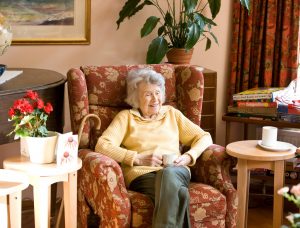Supporting the Government Taskforce’s call for more older people’s housing options, promoting independence, wellbeing and community
 At My Home Life England we welcome the call from the Government’s Older People’s Housing Taskforce to increase the volume, quality and choice of age-friendly, dementia-inclusive, faith and culture-sensitive homes and neighbourhoods for older people in the UK.
At My Home Life England we welcome the call from the Government’s Older People’s Housing Taskforce to increase the volume, quality and choice of age-friendly, dementia-inclusive, faith and culture-sensitive homes and neighbourhoods for older people in the UK.
Greater age-appropriate housing will promote independence, wellbeing and community – three elements integral to supporting the quality of life of aging adults.
We are proud that the co-founder of My Home Life, Julienne Meyer CBE, had the prestigious role of Chair of the Taskforce. Julienne is a leading expert in care for older people and Professor Emerita of Nursing at City St George’s, University of London, where My Home Life England is based.
The Taskforce has been collating and building the evidence over the past 12 months, including speaking to older people themselves. Their newly released report, ‘Our Future Homes: Housing that promotes wellbeing and community for an ageing population’, sets out 10 core recommendations to help meet the housing needs of our society.
Importantly, this includes embracing and enhancing multiple later living housing options, including mainstream housing, community-led housing, service-led housing – supported living and assisted living options – and, though not the focus of the report, care homes (residential and nursing).
 Julienne, Chair of the Taskforce, said
Julienne, Chair of the Taskforce, said
“We urgently need to widen the range of housing options for senior citizens. They want to live independently and feel safe in an environment that enables them to enjoy life, engage with others, feel culturally connected and be appreciated for their contributions. They also want to be in a familiar area near to their family and friends.
By enhancing the quality and quantity of Older People’s Housing /Later Living Homes and offering more choice, not only can we improve the lives of senior citizens, but we can also save money for the NHS by avoiding unnecessary hospital admission from slips, trips and falls. It’s also important to think carefully about how we can support those who want to remain in their own homes to do so safely.
We are at a sliding door moment – the number of people of pensionable age is rising faster than people of working age – requiring us to find creative solutions to these challenges. A big step in the right direction might be for all agencies across the whole system to recognise that age-friendly and inclusive homes and neighbourhoods work for everyone.”
 Tom Owen, Director of My Home Life England, said:
Tom Owen, Director of My Home Life England, said:
“My Home Life England congratulates Julienne on her role chairing the Taskforce and we support its call for more age-appropriate housing options for older people. Accessible, meaningful choice from a range of options is key to meeting the needs of our ageing population, who have diverse identities and an increasing complexity of health needs. We know that supporting older people to live well, retain their independence and remain well-connected to their local communities is fundamental to quality of life, improves health and wellbeing, and ultimately reduces NHS pressures.
Equally, valuing and nurturing the workforce of all housing with care settings must also been seen as an integral component to supporting our ageing population. High-quality professional development which boosts the leadership skills, professional confidence and resilience of these individuals will enable them to best support older adults as they progress through later life.”
See the report
Key findings of the Taskforce include:
- Our older population is growing and becoming more diverse.
Over 65s are 18.6% of our population (up 2% points in 10 years). By 2040, 26% will be over 65 making the UK a ‘super-aged’ society.
- Limited supply of older people’s housing.
We need an estimated 30-50,000 new later living homes each year to meet this growth – but we only build around 7,000 per year
- Living in under-occupied housing.
Nearly 9 /10 people aged 65-79 live in under-occupied housing, with more than half living in homes with 2+ excess bedrooms.
- The current ‘offer’ is unaffordable for most senior citizens.
Research by the Taskforce shows current private leasehold older people’s housing options are unaffordable for the majority of English households aged 75+
- Lagging globally.
Around 0.6% live in Housing with Care in the UK – this is a tenth of the proportion in more mature markets such as USA, Australia and New Zealand.
- Benefits of later living homes.
As the vast majority of over 65s currently live in mainstream housing, they risk missing out on the proven health benefits of older people’s housing – with significant implications for the NHS due to avoidable hospital admissions and delayed discharges.
- Living in age-inappropriate housing.
Only 12% of senior citizens had level access to the entrance of their building; less than half had a bathroom on the entry level of their home.
- Not planning for the future.
Older people are unaware of the options available to them and admit to ‘burying their heads’ as to their future housing needs.
Taskforce core recommendations:
- Standardise definitions of Older People’s Housing (OPH)/Later Living Homes (LLH)
- Incentivise a wide range of OPH/LLH options
- Ensure more housing is designed for later life
- Create age-friendly, dementia-inclusive, faith and culture sensitive communities
- Expand OPH/LLH at scale and ensure it is affordable to live in, and viable to finance, build and operate
- Strengthen planning policies
- Establish a national information platform and local hubs
- Build consumer confidence
- Enhance innovation, research and professional development
- Create collective leadership to drive change